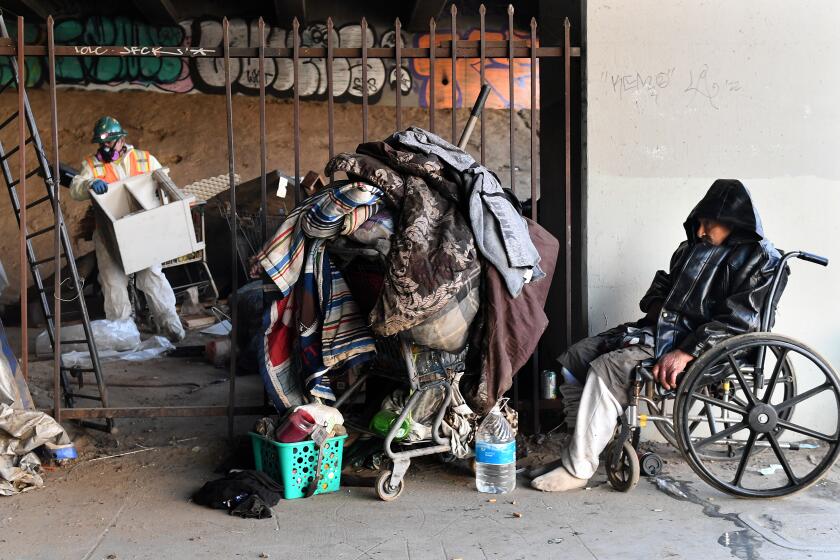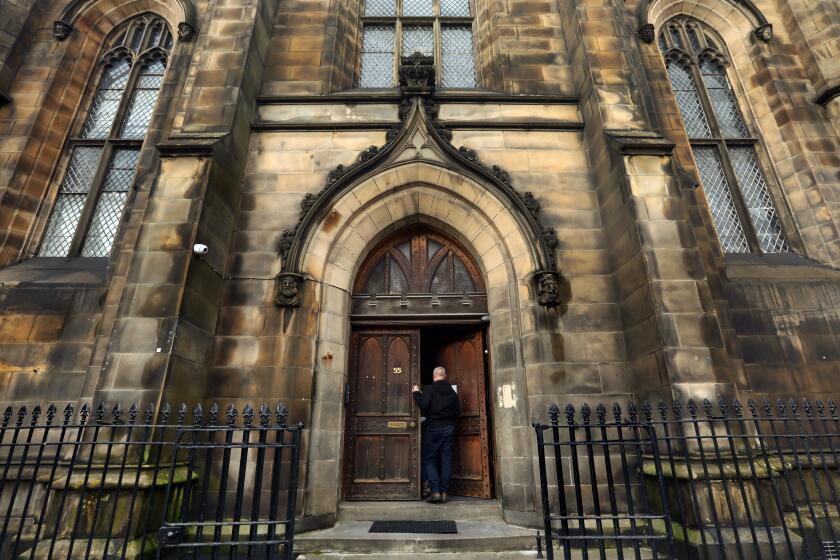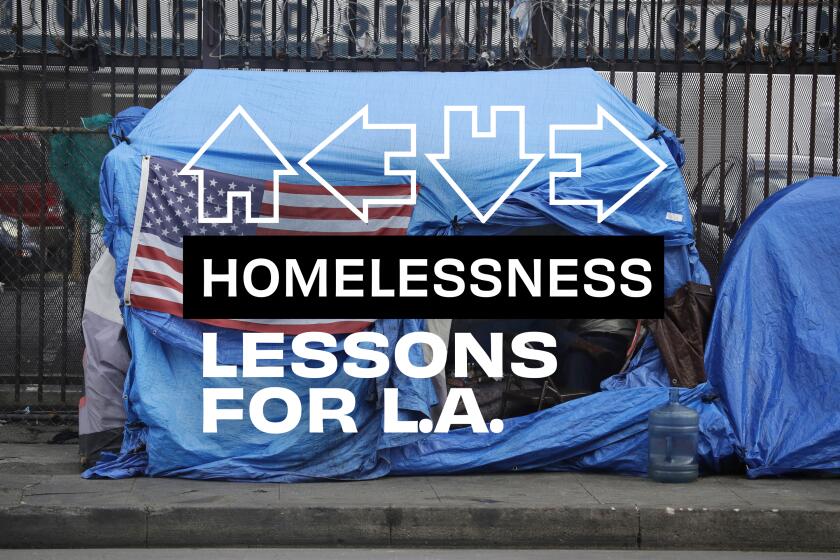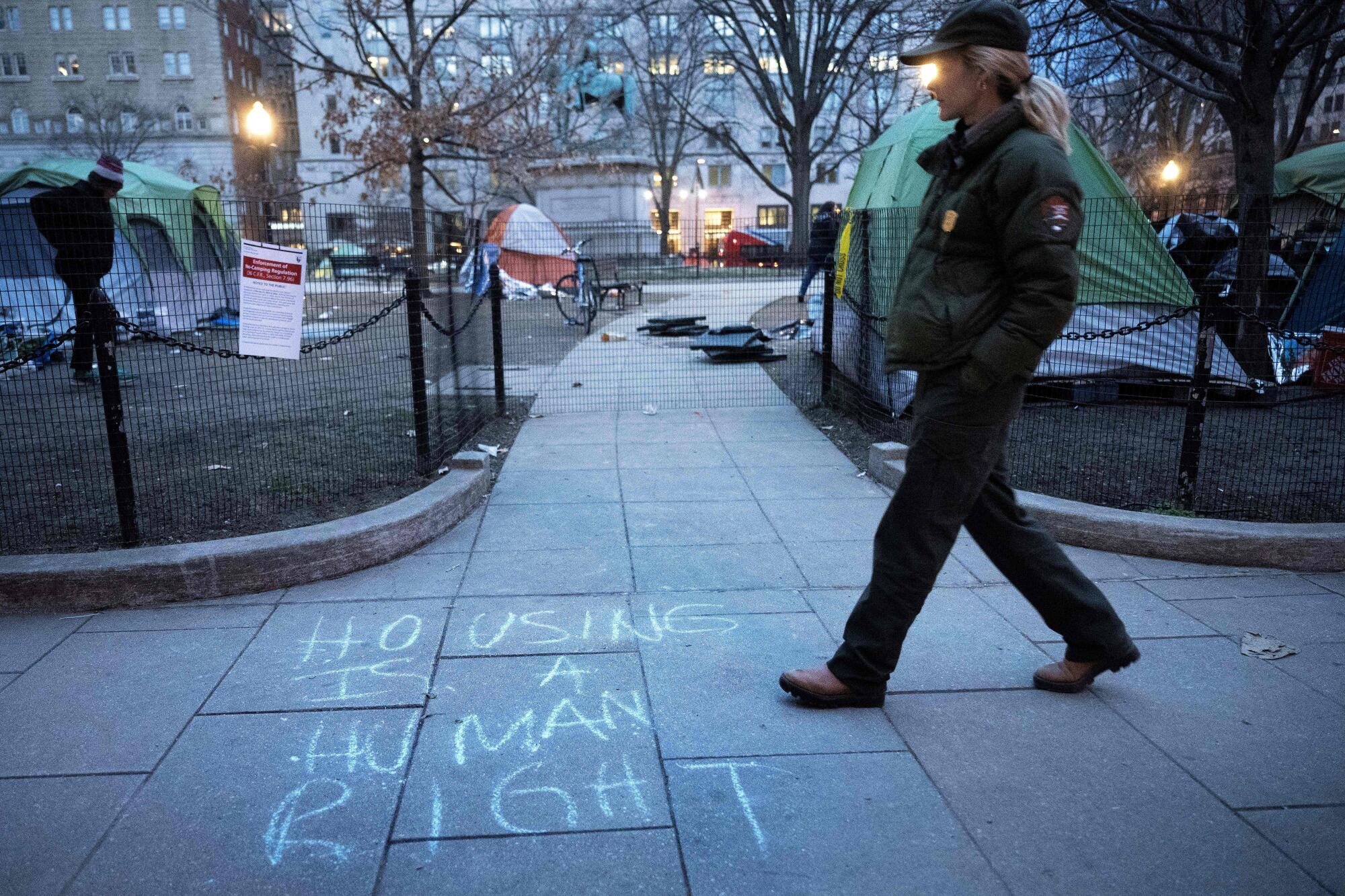
- Share via
WASHINGTON — Mayors Karen Bass of Los Angeles and Muriel Bowser of Washington, D.C. — Democrats leading two of the nation’s most prominent and progressive cities — epitomize the plight big-city mayors around the country face as they tackle a growing number of homeless encampments, and the complaints that come with them.
While both cities have removed some of the most visible tents, Washington looks and feels less saturated with homeless people than Los Angeles, especially in the tourist areas around the White House, Capitol Hill and the national monuments.
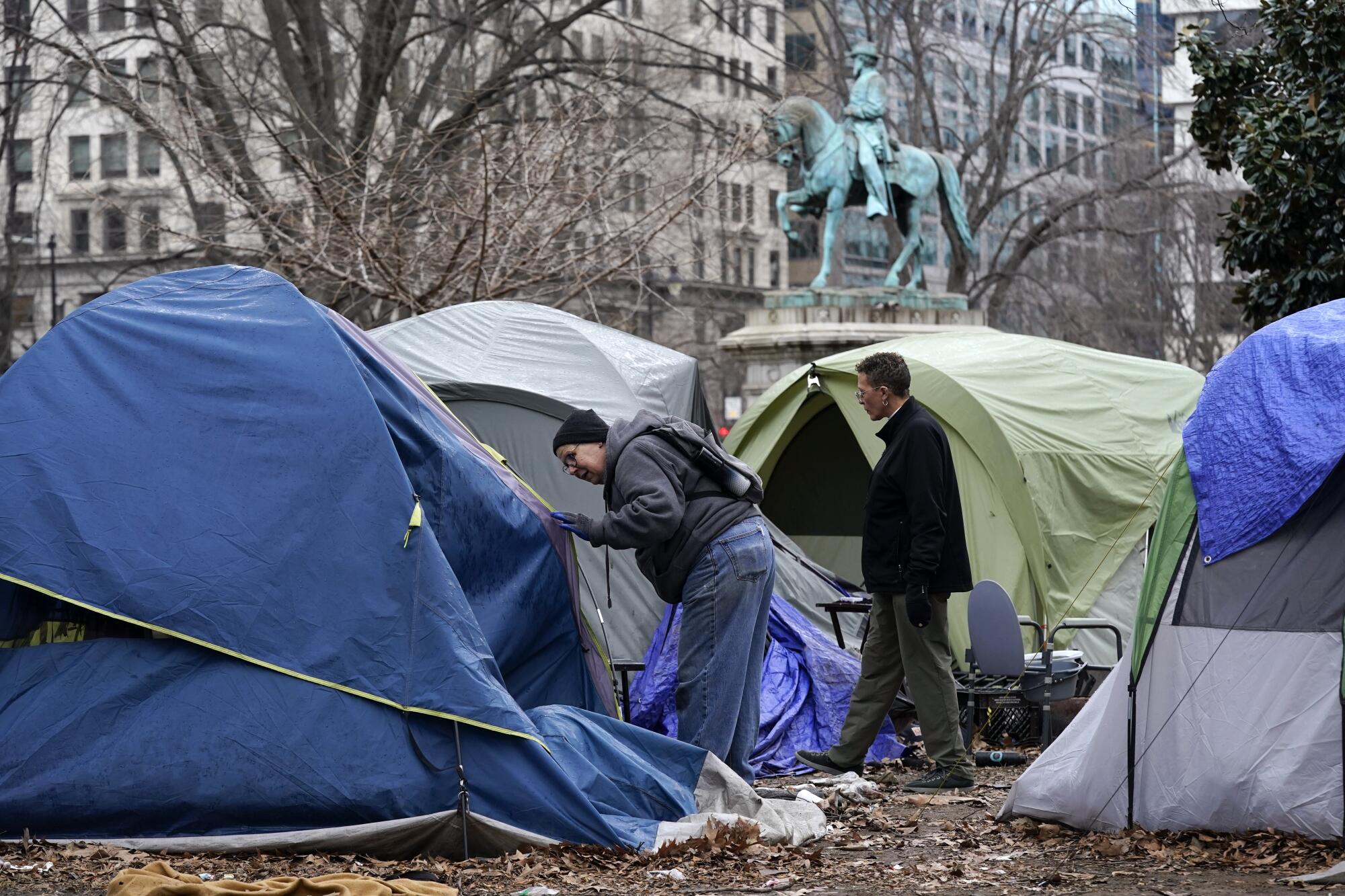
The first reason is sheer numbers. Washington has about 61% as many unhoused people as the city of Los Angeles on a per capita basis, and only about 14% as many living on the street, according to local estimates.
The second factor is the federal government, which oversees most city parks here, as well as larger attractions such as the National Mall. The National Park Service and other federal agencies have traditionally been more aggressive in enforcing no-camping policies, sometimes after prodding from local officials, according to homeless people and advocates.
Rulings by the 9th Circuit Court of Appeals have made it harder for officials in California and other Western states to clear encampments. The Supreme Court could take up the issue early next year.
Finally, neither Bowser nor the federal government faces the same legal constraints as Los Angeles and other Western cities, which are subject to some unique 9th Circuit Court of Appeals rulings that have left some doubt as to whether camps can be removed if the city lacks shelter space for its entire homeless population.
Though Bass’ signature program, Inside Safe, has moved nearly 2,000 people from public spaces into housing since she took office, it remains voluntary, meaning some homeless people can choose to stay in their tents.
Bass has said encampments are a defining issue, the reason she ran for the job.
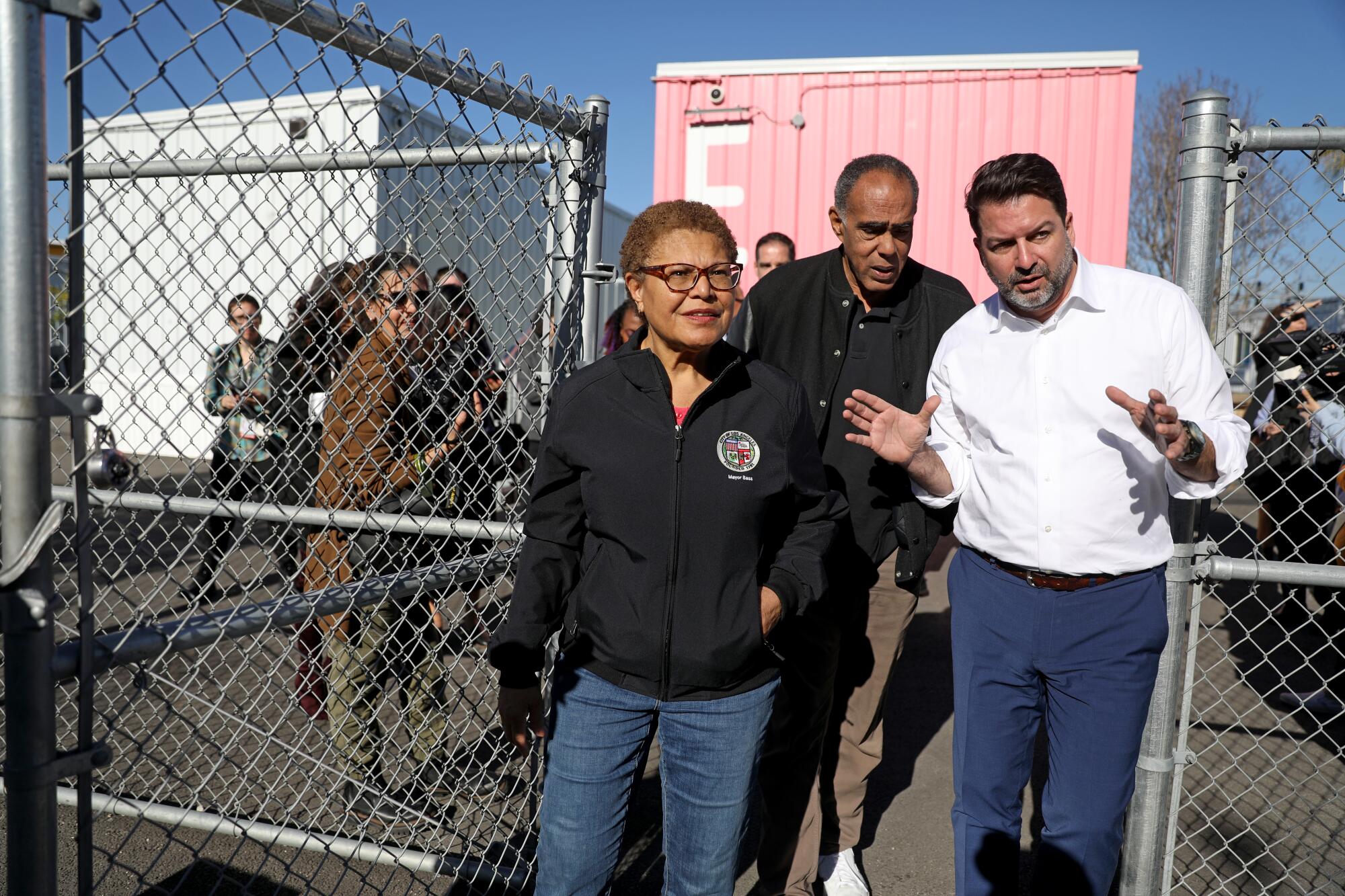
“I was worried that L.A. was at a crossroads where people were getting ready to take a very punitive approach, because we’ve taxed ourselves three times and the problem just keeps getting worse,” she said in October at Bloomberg CityLab, a Washington conference for mayors and other government leaders.
The issue is not as dominant in Washington, but has sparked similar political flashpoints. In February, after the Park Service and district officials cleared a large encampment in McPherson Square, a federal park near the White House, Bowser called it a matter of safety for those living in the tents.
“What we’re doing is insisting people get connected to the services that we know work,” she said.
City officials, advocates and homeless people here all say D.C. has been more aggressive in closing encampments since the end of the pandemic.
Many in Los Angeles and California support a legal right to housing. Here’s how that works in Scotland.
“We are seeing an uptick in D.C. and across the country,” said Eric Tars, senior policy director with the National Homelessness Law Center.
“We can all agree that nobody wants to see encampments on our corners, on our parks, on the National Mall,” he added. But instead of building housing, which is more cost-effective than sending people to jail, he said leaders find it politically easier to use “law enforcement to punish people for things that are outside of their control and making things worse.”
City officials say the increase in removals was guided by the pandemic. When the city shut down, homeless people began erecting tents in newly empty places, said Wayne Turnage, deputy mayor for the District of Columbia Health and Human Services. When the pandemic ended, officials stepped up efforts to find those people housing, he said.
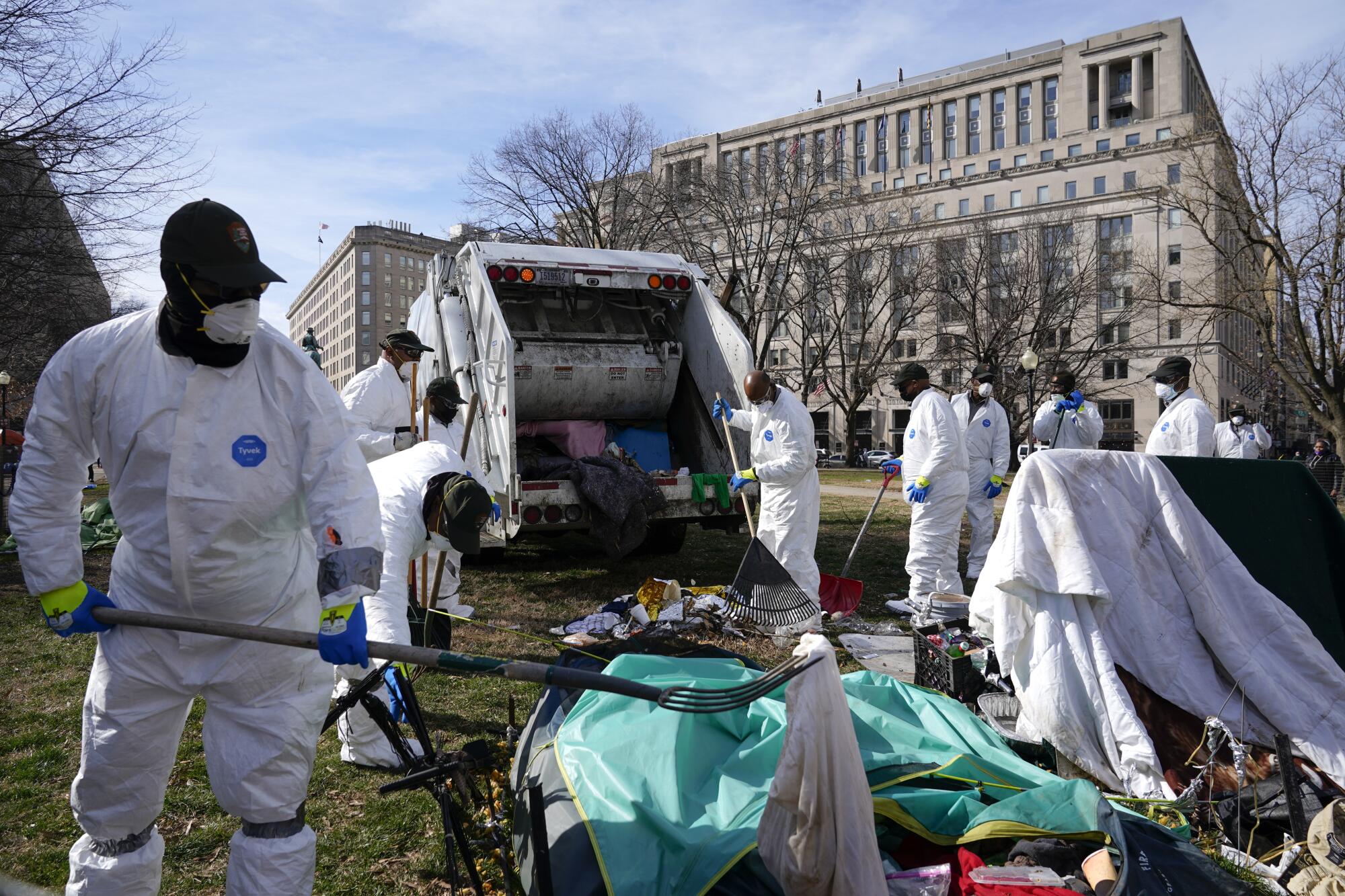
Many encampments “were unhealthy or unsafe,” he said. “That was a heavy lift.”
Turnage said the district prioritizes closing encampments that pose a safety risk and will leave some encampments intact after they are cleaned up by city workers.
In an email, Cynthia Hernandez, a National Park Service spokesperson, said the park service “is dedicated to ensuring the safety and enjoyment of all visitors to NPS parks as well as the preservation of natural and cultural resources while also respecting the rights and dignity of individuals experiencing homelessness.”
Why is homelessness so much worse in Los Angeles than in other parts of the country, even as other cities also combat poverty, drug addiction and crime?
Many homeless people in Washington describe needing to move often or steer clear of areas that are likely to be targeted.
Kevin Madden, 61, said he has had to move his tent twice in recent months after Park Police kicked him out. They once left a note on his tent in Georgetown giving him a couple days’ notice to evacuate, he said.
“The police said I had to leave the property,” he said, adding they offered “no kind of resources.”
Derian Mize, 30, said Park Police and D.C. police threw away his and three other people’s belongings last year after posting a warning in a park where they were staying in the city’s more affluent northwest residential neighborhood.
The park had a water pump and an electrical outlet, which made it an attractive place to stay. But the arrangement lasted only six weeks. He heard residents discussing his tent and saw people whom he believed were with the city photograph it.
“They’re not having that” in wealthy neighborhoods, he said.
He now lives in one of six tents behind some trees beside a parkway, between the tourists of Georgetown and the government officials and lobbyists who work around the White House.
One of his neighbors in the encampment, Leroy Fenner, 38, said he prefers the site because it is calmer than other encampments. McPherson Square, the massive encampment that was cleared by officials, had a reputation among homeless people as dangerous, he said.
“I don’t want to be a part of the drugs, the violence, all of that,” he said. “Some of us is just hard on our luck and just want to get our lives back in order. Yeah, so we don’t want to be in places like McPherson Square, because it will trap you there.”
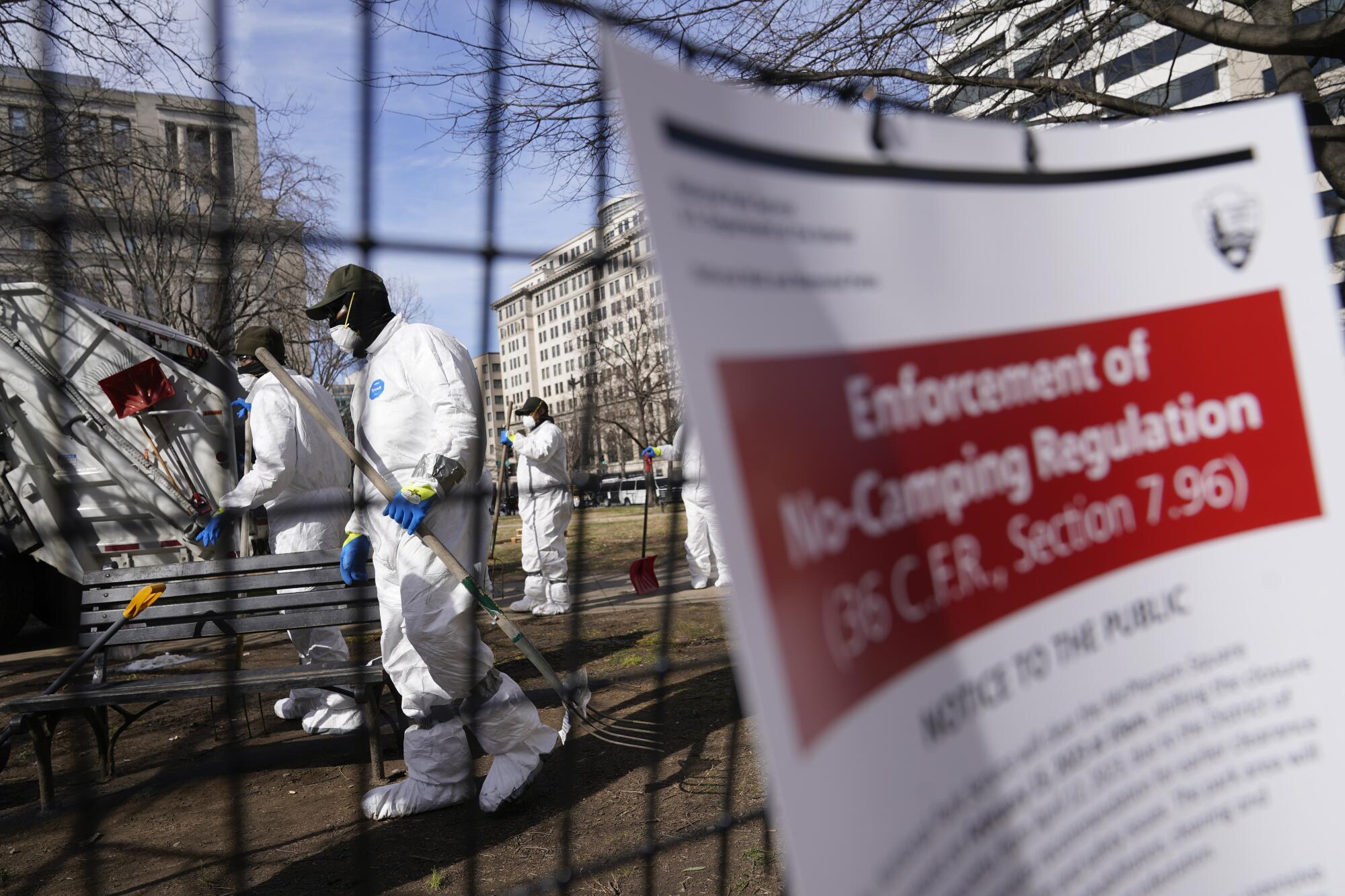
Business owners say they are conflicted. “There’s got to be a better solution,” said Paul Dougherty, president of a real estate investment firm with downtown buildings in Washington, Los Angeles and San Francisco.
Dougherty, part of a business group that advises Washington’s government, supported the decision to clean up the encampment at McPherson Square. He said it had become unsafe for the people who lived in the tents and had prompted at least one firm to move its office because workers felt unsafe.
“There’s been fires in these tents, stabbing, a lot of crime,” he said. “There’s been rapes.”
But the situation in D.C. is far more manageable than in Los Angeles or San Francisco, according to Dougherty, who has seen the crisis firsthand in all three cities.
“It doesn’t compare,” he said. D.C., he said, is “not anything like that.”
More to Read
Sign up for Essential California
The most important California stories and recommendations in your inbox every morning.
You may occasionally receive promotional content from the Los Angeles Times.
